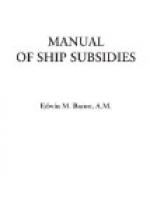Not all of the shipping and navigation bounties were to go to shipowners. Five per cent was to be retained for sailors’ insurance “with a view to reducing the deductions imposed on them for the purpose of that insurance”; and six per cent to be reserved for distribution for the benefit of marines, as follows: “two-thirds to the provident fund, with a view to diminishing the deductions on mariners’ pay and to increasing the funds for assisting the victims of shipwreck and other accidents, or their families; one-third to the invalids’ fund, with a view to granting subventions to the chambers of commerce or public institutions for the creation and support of sailors’ homes in French ports, intended to assist the nautical population, or of any other institutions likely to be of use to them, especially schools for seamen.” The requirement in the old law of 1793 as to the composition of the crews of French merchant ships was modified, reducing the proportion of sailors who must be Frenchmen.
French-built ships were privileged to chose between the shipping and the navigation bounties. To obtain the shipping bounty for the maximum of three hundred days steamers must make during the year a minimum of thirty-five thousand miles if engaged in the overseas trade, or twenty-five thousand if in “cabotage international."[CA] Shipowners agreeing to maintain on routes not served by the subsidized main steamers a regular line, performing a fixed minimum of journeys per year, with vessels of a certain age and tonnage, were permitted to claim, in lieu of the regular bounties, a fixed subsidy during the term of their agreement, equal to the average of the bounties to which the vessels in commission would be entitled for the whole of the journeys performed. The new tonnage to be admitted to the benefit of the law was limited to three hundred thousand gross tons of steamers and one hundred thousand gross tons of sailing-ships; of which new tonnage freight-built ships could form two-fifths. The appropriation for the payment of the bounties was also limited, to guard against a too heavy burden upon the national treasury. This was fixed at two hundred million francs: one hundred and fifty million for the shipping and navigation bounties and fifty million for the construction bounties.[CB]
Unforeseen results of an unsatisfactory nature followed the application of this law. Professor Viallates effectively states them in the fewest words:
“To be sure of profiting by the advantages of the law the ship-owners hastened to order vessels and to place them on the stocks. Their haste increased when it was seen that there existed a considerable discrepancy between the allowed tonnage and the money appropriated. The appropriation of one hundred and fifty million francs, opened to assure the payment of the navigation bounties and the compensation for outfit, was much too little. The rush was such, as soon as this formidable mistake was discovered, that,




